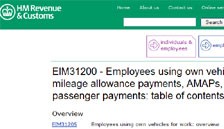ACFO, which represents fleet operators, has called on the Government to announce its decision on changes to the Authorised Mileage Allowance Payments (AMAP) scheme.
There have been several reviews of the AMAP system, but to date the Chancellor of the Exchequer Alistair Darling has refused to announce his plans, or even to signal whether the rates will rise or fall.
ACFO has now come out saying this uncertainty is negatively impacting on fleet decision-makers.
The association’s director Stewart Whyte, said: “All parts of the fleet industry want and need closure on both of these issues.
"Fleet operators have no clear view of the strategy, so cannot design effective changes…It is now time the new fiscal rules were announced with a timetable for their introduction.
"If they don’t have the answers by now, they never will.”
ACFO’s said tax regimes on business travel by car need to be as tax neutral as possible so as not to drive employers and employees towards any specific corporate transport option.
“Flexibility for employers is a key requirement, to account for the huge range of driving at work requirements,” it said.
“Environmental tax elements on motoring should apply to the vehicle, rather than on the ownership, funding system or purpose of the journey.”
This has been interpreted by Nick Sutton chairman of Provecta, which promotes alternatives to company cars, as a call for a reduction in AMAP rates.
“The total cost of motoring has risen significantly in recent years, but AMAP rates have remained the same for six years.
"The simple fact is they need to go up not down,” he said.
“If AMAP rates are devalued, there will not be a wholesale flood into company cars – many of these drivers are not entitled to company cars.
"So if they have less money to spend on a car, they will be driven into older, dirtier vehicles.”
However Mr Whyte said the association is not calling for a reduction in the AMAP rates, but rather a system that takes into account all of the variables.
“It is simply illogical to subject high-emitting company cars to penal levels of tax, but allow tax breaks for the same car, used on the same journeys, but owned by the employee,” he said.
“If the aim is to reduce carbon, it’s the vehicles used and the total mileage that need to be taxed.
"Vehicle-produced CO2 has the same impact on the environment, irrespective of whose name is in the log-book.”













Login to comment
Comments
No comments have been made yet.